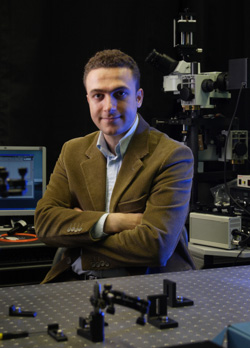Aydogan Ozcan received HHMI Professorship
by Bahri Karacay
 The Howard Hughes Medical Institute (HHMI) recently announced 15 leading scientist-educators as HHMI Professor, including Aydogan Ozcan. Dr. Ozcan is the Chancellor’s Professor of electrical engineering and bioengineering at the UCLA Henry Samueli School of Engineering and Applied Science. He is also the associate director of California nanosystems Institute (CNSI) and the founder of Holomic LLC. Dr. Ozcan was recognized for his breakthrough research and innovative approach with undergraduate teaching. As a recognized HHMI professor, Dr. Ozcan will receive $1 million over the next five years to create innovative approaches that will integrate his research on undergraduate learning with the aim of enhancing students’ understanding of science.
The Howard Hughes Medical Institute (HHMI) recently announced 15 leading scientist-educators as HHMI Professor, including Aydogan Ozcan. Dr. Ozcan is the Chancellor’s Professor of electrical engineering and bioengineering at the UCLA Henry Samueli School of Engineering and Applied Science. He is also the associate director of California nanosystems Institute (CNSI) and the founder of Holomic LLC. Dr. Ozcan was recognized for his breakthrough research and innovative approach with undergraduate teaching. As a recognized HHMI professor, Dr. Ozcan will receive $1 million over the next five years to create innovative approaches that will integrate his research on undergraduate learning with the aim of enhancing students’ understanding of science.
Dr. Ozcan's research focuses on photonics and its applications to nano and biotechnology with the goal of creating solutions for global health problems. Dr. Ozcan and his team invented several devices including one that converts smart phones into a microscope that can be used to count blood cells, and another that can detect environmental contaminants in drinking water, or even the one that can detect the virus causing HIV-AIDS.
“Exceptional teachers have a lasting impact on students,” said HHMI President Robert Tjian. “These scientists are at the top of their respective fields and they bring the same creativity and rigor to science education that they bring to their research.”
"I am very excited and humbled to be appointed as an HHMI Professor "said Dr. Ozcan. "HHMI Professors are selected among the leading research scientists in the nation who also are deeply committed to making science more engaging for undergraduates".
Dr. Ozcan is one of forty scientists who have been named HHMI professors since the program’s initiation in 2002. This year 173 scientists submitted proposals to HHMI and 15 were chosen by a panel of distinguished scientists and educators. The new HHMI professors can use up to 25 percent of their HHMI funding to support research activities geared towards student learning.
Dr. Ozcan plans to launch a large scale interdisciplinary undergraduate research and training program to promote and facilitate the innovation, design and translation processes of his laboratory's computational biophotonics, imaging, sensing and diagnostics technologies toward telemedicine and global health applications. Dr. Ozcan's laboratory has a long tradition of supporting undergraduate research and training. Every quarter, 10 to 15 undergraduate students join research projects in his laboratory, and over the last 6 years, undergraduate researchers working with Dr. Ozcan's team co-authored 46 refereed journal articles and 100 conference proceedings.